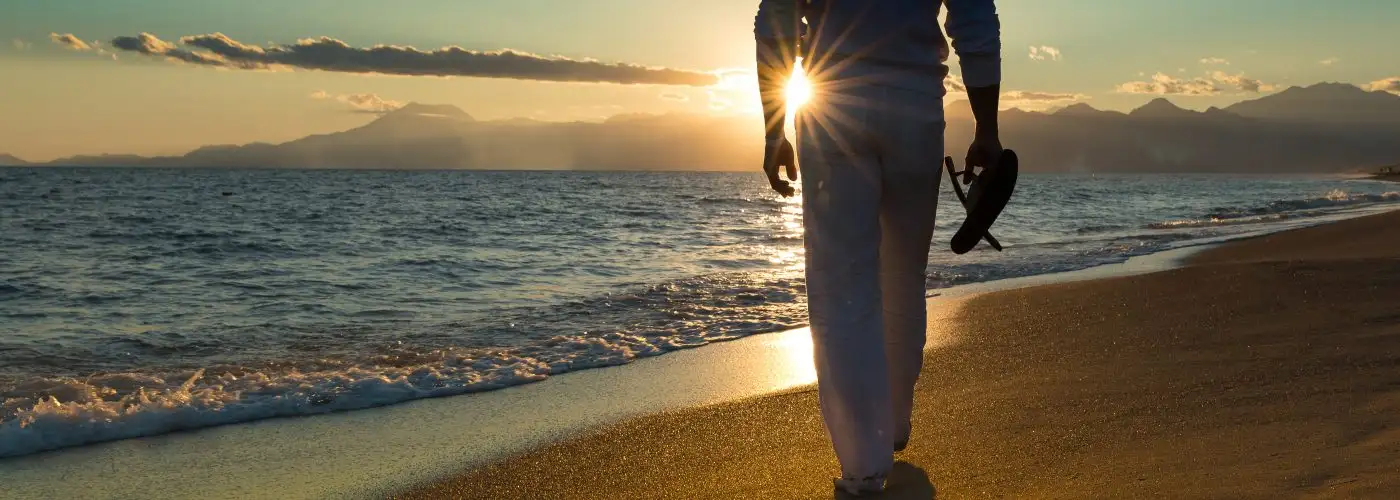A barefoot walk on the beach is one of the greatest pleasures of a tropical vacation. Unfortunately, it can put you at risk for an unpleasant disease that few travelers know about: hookworm.
Eddie Zytner and Katie Stephens were on vacation at a resort in Punta Cana, Dominican Republic, when their feet began itching. It wasn’t until they got home to Ontario, however, that the itching turned into painful blisters, reports CNN. (A word of warning: Don’t click on that link unless you’re prepared to see photos of Stephens and Zytner’s tormented feet.) They were diagnosed with cutaneous larva migrans, caused by an invasion of hookworm parasites.
What Is Hookworm, and What Are the Symptoms?
According to the Centers for Disease Control (CDC), hookworm is a parasite that can live in the small intestine and cause disease. There are multiple types of hookworms—some that can live in humans, and others that live in animals (but can be transferred to humans).
Hookworm eggs are transmitted through the feces of infected people or animals, typically through contaminated soil or sand. When hookworm larvae enter the body, they can cause an itchy and/or painful rash that looks like thin red tracks, marking the movement of larvae under your skin.
Cutaneous larva migrans is a common reaction to an animal hookworm infection, according to the CDC. (Again, be prepared for a graphic photo if you decide to click.) This type of larva can only survive in a human host for approximately five to six weeks before dying off—at which point the itching and pain typically resolve as well. Secondary bacterial infections sometimes accompany the skin lesions.
Hookworms that do survive in humans make their way into the intestine and can cause anemia, abdominal pain, diarrhea, and other symptoms if left untreated.
Where Am I at Risk for Hookworm?
According to the International Association for Medical Assistance to Travellers (IAMAT), travelers are most at risk for hookworm in tropical and subtropical parts of the Caribbean, South America, Asia, and Africa. Travelers on beach vacations are at the most risk.
Though the disease was thought to be eradicated in the United States decades ago, a recent study found a small pocket of hookworm infection in Alabama.
How Can I Prevent Hookworm?
There’s no vaccine you can get in advance to prevent hookworm, and information about the disease is a bit thin on the ground. The CDC’s advice for travelers to the Dominican Republic, for example, mentions six different diseases to watch out for, including hepatitis A, typhoid, and cholera—but not hookworm or cutaneous larva migrans.
“If you’re taking a beach vacation, always wear shoes or sandals, sit on a towel at the beach, and wash your hands and feet with soap and water after touching sand or soil,” advises IAMAT Executive Director Tullia Marcolongo. The IAMAT website also recommends washing your towel after each use.
How Is Hookworm Treated?
Fortunately, the disease is fairly easy to resolve. Hookworm treatment involves anti-parasitic drugs such as tiabendazole (applied topically) and mebendazole (an oral medication usually taken for about three days).
More from SmarterTravel:
- 5 Diseases in America You Could Get While Traveling
- Bedbugs: Everything You Wanted to Know But Were Too Disgusted to Ask
- Food Safety: How to Avoid Getting Sick While Traveling
Follow Sarah Schlichter on Twitter @TravelEditor for more travel tips and inspiration.
We hand-pick everything we recommend and select items through testing and reviews. Some products are sent to us free of charge with no incentive to offer a favorable review. We offer our unbiased opinions and do not accept compensation to review products. All items are in stock and prices are accurate at the time of publication. If you buy something through our links, we may earn a commission.
Related
Top Fares From
Today's Top Travel Deals
Brought to you by ShermansTravel
Porto to Lisbon: 7-Nt, Small-Group Portugal...
Indus Travels
 vacation
$1899+
vacation
$1899+
Luxe, 12-Night Spain, France, Monaco &...
Regent Seven Seas Cruises
 cruise
$12599+
cruise
$12599+
Ohio: Daily Car Rentals from Cincinnati
85OFF.com
 Car Rental
$19+
Car Rental
$19+




